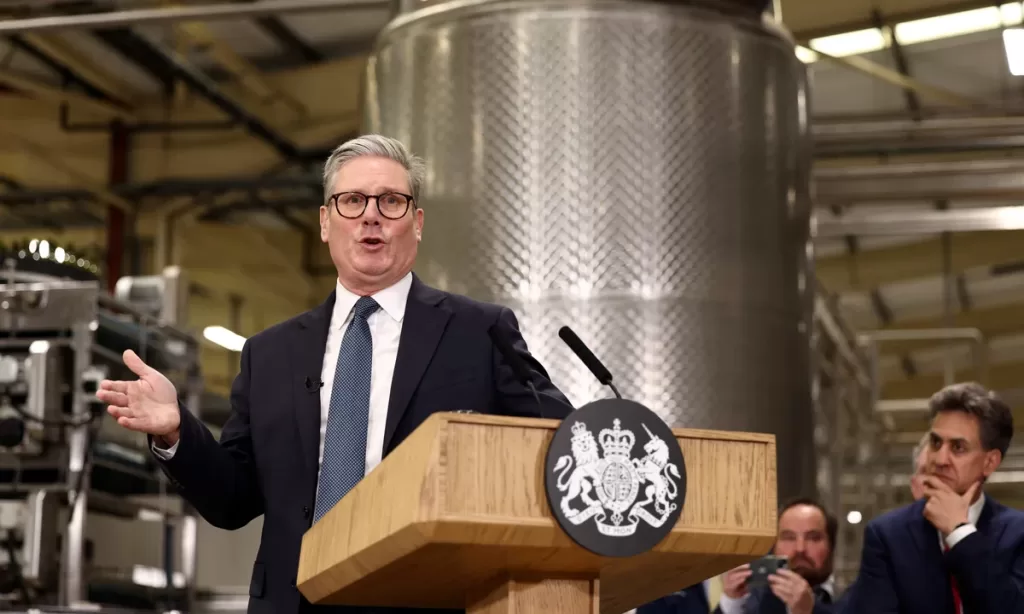Introduction: Keir Starmer Chagos Islands
In a move that has sparked a political firestorm, UK Prime Minister Keir Starmer has defended the decision to cede control of the Chagos Islands to Mauritius, a controversial agreement that aims to secure the future of the crucial US-UK military base on Diego Garcia. Starmer described this agreement as the “single most important thing” for the UK’s national security, amidst a growing blame game among Conservative leadership candidates.

Understanding the Background of the Chagos Islands Dispute
The Chagos Islands, located in the Indian Ocean, have been a subject of heated debate since the 1960s. Following the decolonization period, the UK retained control of the islands despite their strategic military importance. The US has operated a key military base on Diego Garcia since 1971, which has played a pivotal role in various conflicts and operations across the globe. Critics argue that the recent decision could potentially open doors for China to establish a military presence in the Indian Ocean, heightening geopolitical tensions in the region.
Political Fallout: Conservative Infighting Over the Decision
The announcement has ignited a fierce backlash from Conservative leaders, many of whom are now in a leadership race. Former Defence Secretary Grant Shapps criticized Starmer’s decision, stating, “As Defence Secretary, I was so concerned about the sovereignty of the Chagos Islands that I blocked the deal from proceeding.” Shapps’s comments reflect a growing rift within the Conservative Party, as he expressed discontent with how the current government has handled the issue.
Moreover, former Prime Minister Boris Johnson lambasted the decision, claiming it was “crazy” to relinquish control of the Chagos Islands. He emphasized the strategic significance of the Diego Garcia base, calling it “a key component of the Anglo-American alliance.” Johnson attributed the decision to political correctness and a desire to project a favorable image internationally.
The Role of Liz Truss and James Cleverly in Negotiations
Interestingly, the roots of this agreement can be traced back to the tenure of Liz Truss, who initiated negotiations with Mauritius during the Cop26 climate summit. James Cleverly, then Foreign Secretary, was optimistic about concluding the negotiations by the end of 2023. However, as tensions rose within the Conservative Party, Truss’s spokesperson pointed fingers at Johnson for initiating the talks, complicating the leadership dynamics.
Jonathan Powell’s Rebuttal and the Labour Position
In response to the backlash from Conservative figures, Jonathan Powell, Starmer’s special envoy for negotiations, defended the agreement. He noted that Cleverly, who is now a contender for Conservative leadership, had previously shown enthusiasm for the negotiations. Powell dismissed the criticisms from Tory leaders as “silly,” arguing that securing the base was paramount for national defense.
Starmer reassured the public that no other British overseas territories would be affected, underscoring the strategic importance of the US-UK military base. He stated, “The single most important thing was ensuring that we had a secure base. We’ve now secured that, and that is why you saw such warm words from the US yesterday.”
A 99-Year Agreement: What Lies Ahead?
The agreement is projected to sustain the UK-US military presence on Diego Garcia for 99 years, with options for renewal. Under the terms, the UK will compensate the Mauritian government with an annual payment, ensuring continued collaboration in military efforts.
Timeline of Events Surrounding the Chagos Islands
- 1965: The UK detaches the Chagos Islands from Mauritius, creating a British Indian Ocean Territory (BIOT).
- 1971: The US establishes the military base on Diego Garcia.
- 2022: Negotiations begin under the Truss administration.
- October 2024: Starmer announces the agreement to cede control to Mauritius.
Expert Opinions on the Chagos Islands Agreement
Several experts have weighed in on the implications of this agreement. Dr. Emily F. Hughes, an international relations scholar, commented, “The return of the Chagos Islands to Mauritius is a pivotal moment in colonial history, but the strategic ramifications for the UK and its defense alliances cannot be understated.”
Professor Robert J. Morris, a geopolitical analyst, noted, “This deal, while politically contentious, underscores the ongoing importance of strategic military partnerships in a rapidly changing global landscape.”
Conclusion: A Divisive Yet Strategic Move
Starmer’s decision to relinquish control over the Chagos Islands has stirred a complex mix of political maneuvering and strategic considerations. While securing a vital military base is a priority for national security, the repercussions of this decision on domestic politics and international relations remain to be seen. The ongoing debate will likely shape the future of British foreign policy, as both parties grapple with the legacy of colonialism and the realities of modern geopolitics. As we move forward, only time will tell how this decision plays out in the grand tapestry of international relations and military strategy.
For Regular News and Updates Follow – Sentinel eGazette
FAQs
1. What are the Chagos Islands?
The Chagos Islands are a group of islands in the Indian Ocean that were part of the British Indian Ocean Territory and have been a subject of political dispute since the 1960s.
2. Why is Diego Garcia important?
Diego Garcia is significant due to its strategic military base used by the United States and the UK, serving as a vital hub for military operations in various global conflicts.
3. What was the reaction to Starmer’s decision?
The reaction has been mixed, with strong criticism from Conservative leaders and some support for the strategic importance of securing the military base.
4. How long is the military agreement expected to last?
The military agreement is projected to last for 99 years with options for renewal.
5. What are the implications of this decision on UK foreign policy?
The decision may impact the UK’s relations with its overseas territories and other nations, especially regarding geopolitical tensions in the Indian Ocean.